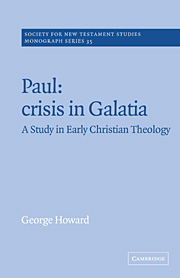Book contents
- Frontmatter
- Contents
- Preface to the first edition
- Preface to the second edition
- Introduction to the second edition
- Abbreviations
- 1 Paul's opponents in Galatia
- 2 Paul the apostle to the Gentiles
- 3 Justification by faith
- 4 Paul's view of the law
- Notes
- Bibliography
- Index of subjects and names
- Index of passages quoted
1 - Paul's opponents in Galatia
Published online by Cambridge University Press: 22 September 2009
- Frontmatter
- Contents
- Preface to the first edition
- Preface to the second edition
- Introduction to the second edition
- Abbreviations
- 1 Paul's opponents in Galatia
- 2 Paul the apostle to the Gentiles
- 3 Justification by faith
- 4 Paul's view of the law
- Notes
- Bibliography
- Index of subjects and names
- Index of passages quoted
Summary
Modern Pauline studies began with the Tübingen scholar, F. C. Baur. In 1831 he published his ‘Die Christuspartei in der korinthischen Gemeinde, der Gegensatz des petrinischen und paulinischen Christenthums in der ältesten Kirche, der Apostel Petrus in Rom.’, in which he first articulated his thesis that primitive Christianity was characterized by a conflict between Petrine and Pauline factions. Starting from 1 Cor. 1: 11–12, which delineates parties of those who followed Paul, Apollos, Cephas, or Christ, he argued that in reality there were only two parties, that of Peter which included the party of Christ and that of Paul which included the party of Apollos. The former group was the Jewish Christian Church which differed from Judaism proper mainly in that it accepted Jesus as the Messiah. It was this group that founded the church in Rome, opposed Paul at Corinth and Galatia, later came to be known as the Ebionites and was considered heretical by the church writers of the post-apostolic period. An important witness to Petrine Christianity, according to Baur, is the Pseudo-Clementine writings which record a struggle between Peter and Paul, who in these writings is camouflaged as Simon Magus.
Baur's thoughts on Paul came to full fruition in 1845 when he published his now famous Paulus.
- Type
- Chapter
- Information
- Paul: Crisis in GalatiaA Study in Early Christian Theology, pp. 1 - 19Publisher: Cambridge University PressPrint publication year: 1990



